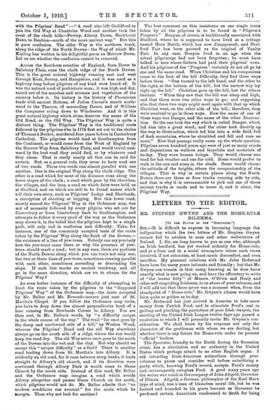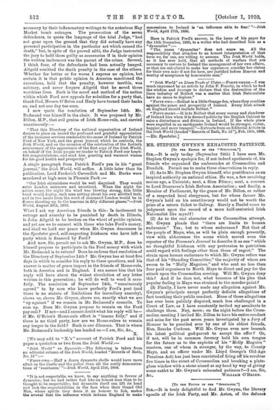LETTERS TO THE EDITOR.
MR. STEPHEN GWYNN AND '111.E1 HOME-RULE DILEMMA.
[TO TEE EDITOS O7 TKO SPECTATOZ."]
Sic, It is difficult to express in becoming language the indignation which the two letters of Mr. Stephen Gwynn cannot fail to awaken in sane and sober wellwishers of Ireland. I, Sir, am long known to you as one who, although an Irish landlord, has yet worked ardently for Home-rule, and at a time and in a social atmosphere where such views involved, if not ostracism, at least much discomfort, and even sacrifice. My personal relations with Mr. John Redmond
have been for many years intimate and friendly ; but that Mr. Gwynn can remain in that camp, knowing as he does know exactly what is now going on, and have the effrontery to write of " the insane folly " of Messrs. O'Brien and Healy and other self-respecting Irishmen, is an abuse of your columns; and I will add too that there never was a moment when, from the standpoint of " Home-rule," Mr. Gwynn's silence would have been quite so golden as to-day.
Mr. Redmond has just arrived in America to take more money from Patrick Ford, and to stimulate Ford's zeal in gulling and pinching the patriotism of poor Irish emigres, the meeting of the United Irish League twelve days ago passed a resolution to which I will presently invite Mr. Gwynn's con- sideration. We shall know by his response not only the character of the gentleman with whom we are dealing, but whether there is any future for Home-rule under its present " official" leaders.
The Spectator, friendly to the North during the Secession crisis, has a circulation and an authority in the United States which perhaps attach to no other English organ. I ask intending Irish-American subscribers through your columns to pause and consider well before subsidising a party which, knowing Ford's record, accepts Ford's money and extravagantly eulogises Ford. A good many years ago the writer was much in the company of John Altgeld, Governor of Illinois. Altgeld, a German philosopher of the Karl Marx type of mind, was a man of blameless moral life, but he was hunted and hounded to his grave because as Governor he pardoned certain Anarchists condemned to death for being
accessory by their inflammatory writings to the notorious Hay Market bomb outrages. The prosecution of the seven defendants, to quote the language of the trial Judge, "had not gone upon the ground that they did actually have any personal participation in the particular act which caused the death," but, in spite of the proved alibi, the Judge instructed the jury to hold them guilty as accessories if in their opinion the written incitement was the parent of the crime. Several, I think four, of the defendants had been actually hanged.
Altgeld remitted the death penalty in the case of the others. Whether for better or for worse I express no opinion, but certain it is that public opinion in America sanctioned the executions, held that the penalty, however terrible, was salutary, and never forgave Altgeld that he saved three worthless lives. Such is the mood and method of the nation within which Ford now appeals for subsidies for a party that, thank God, Messrs. O'Brien and Healy have turned their backs on, and not one day too soon.
I now quote the resolution of September 14th. Mr. Redmond was himself in the chair. It was proposed by Mr.
Dillon, M.P., that evil genius of Irish Home-rule, and carried unanimously :-
" That this Directory of the national organisation of Ireland desires to place on record the profound and grateful appreciation of the immense services rendered to the cause of Ireland by Patrick Ford of New York, and the great journal which he controls, the Irish World, and on the occasion of the celebration of the fortieth anniversary of the appearance of the first copy of the Irish World, on behalf of the Irish people we tender to Patrick Ford our heart- felt congratulations, and send him greeting and warmest wishes for his good health and prosperity."
A single paragraph from Patrick Ford's pen in his "great journal," the Irish World, will suffice. A little later than its
publication, Lord Frederick Cavendish and Mr. Burke were murdered at high noon in Phoenix Park :—
" Our Irish skirmishers would be well disguised. They would enter London unknown and unnoticed. When the night for action came, the night the wind was blowing strong, this little band would deploy, each man setting about his own allotted task, and in two hours from the word of command London would be in flames shooting up to the heavens in fifty different places."—Irish World, August 28th, 1880.
What I ask my American friends is this : Is incitement to outrage and anarchy to be punished by death in Illinois, is John Altgeld to be broken on the wheel of public opinion,
and yet are we to consort with those who take Ford's money, and shall we hold our peace when Mr. Gwynn denounces in
the Spectator good, self-respecting Irishmen who have left a party which is financed by Ford P
And now, Sir, permit me to ask Mr. Gwynn, M.P., does he himself propose to participate in the Ford money with which Mr. Redmond is to return? Does he endorse that resolution of the Directory of September 14th P Mr. Gwynn has at least five days in which to consider his reply to these questions, and his answer is matter of grave import to the friends of Home-rule,
both in America and in England. I can assure him that his reply will have about the widest circulation of any letter -written in this generation ; he will do well to word it care- fully. The resolution of September 14th, "unanimously
agreed" to by men who know perfectly Ford's past (and
there is no statute of limitations for incendiary anarchy), shows us, shows Mr. Gwynn, shows me, exactly what we are 4' up against" if we remain in Mr. Redmond's councils. To sum up. Does Mr. Gwynn propose to remain on the Ford pay-roll ? If not—and I cannot doubt what his reply will be—
if Mr. O'Brien's Home-rule effort is "insane folly," and if -there is no third party, how are we Home-rulers to remain any longer in the field P Such is our dilemma. That is where Mr. Redmond's leadership has landed ns.—I am, Sir, &c., X.
We may add to " X.'s" account of Patrick Ford and his paper a quotation or two from the Irish World :— " Irish World" on Dynamite.—The following is taken from an editorial column of the Irish World, headed "Records of Rath, No. 13 ":— "Fnery-Two.—Half a dozen dynamite shells would have more effect on the Castle and the police than all the costly demonstra- tions of 'resistance.' "—Irish World, April 21st, 1888.
"It is not respectable, we know, to say anything in favour of dynamite; but we had rather feel like an honest man than to be thought to be respectable ; but dynamite itself can lift its head and look the respectabilities in the face when their Grand Old Man, whose spittle they deem it an honour to lick, makes the avowal that the influence which induces England to make concessions to Ireland is ` an influence akin to fear.' "—Irish World, April 17th, 1886.
Here is Patrick Ford's answer, in the issue of his paper for the 13th December, 1890, to a writer who had described him as a "dynamiter" " The name dynamiter' does not scare ns. All the responsibility that attaches to an honest interpretation of that term we, for one, are willing to assume. The Irish World holds, as it has ever held, that all methods of warfare that are necessary to restore to Ireland the management of her own affairs, or that are calculated to make her oppressors consider her claims for their own sake if not for hers, are justified before Heaven and worthy of acceptance by honourable men."
"'Irish World' on Linen Trade of Ulster.—FORTT-TREZE.—I was much impressed by an article by John F. Finerty, in which he had the wisdom and courage to declare that the destruction of the linen industry of Belfast was a matter that Irish Nationalists have no cause to deplore."
" FIFTT•TWO.—Belfast is a little Orange den, where they combine against the peace and prosperity of Ireland. Every Irish attack on England should include Belfast."
"Furry-irtewr.—It is to Belfast that every enemy and slanderer of Ireland hies when it is deemed politic by the English Cabinet to raise a disturbance and division in Ireland. If the whole place were engulfed in an earthquake Ireland would be stronger, richer, happier, and more tranquil."—Extracts from an Editorial Article in the Irish World (headed "Records of Bath, No. 13"), Feb. 13th, 1888.
—ED. Spectator.]



























































 Previous page
Previous page